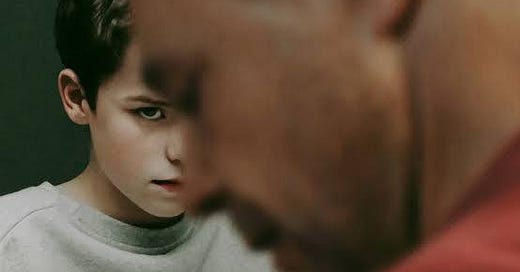I loved Adolescence. Loved it in a way that lingered—painful, anxious, necessary. The discomfort of looking society straight in the eye is educational. It should be mandatory.
Stories, when told well, can do more than a hundred statistics, and this one is powerfully crafted. There are threads deliberately woven, forming a tapestry of misogyny that many refuse to see.
This piece will contain spoilers, so please watch it first and then come back. And let's discuss it together in the comments!
Why, Jamie? Why?
But the series tells us why. And it is difficult and heartbreaking, because it isn't a single big reason but many small ones. The series excels at depicting all the little things that went wrong, inviting us to pay attention—or ignore them, as we often do in real life. It shows how multilayered the answer is, highlighting shared responsibility.
The show brilliantly debunks the idea of monsters or lone wolves, perpetrators who were once victims of some horrendous attack. The perpetrators are also our sons, our neighbours, the kid whose favourite subject is history, my friend’s brother—anyone.
Jamie is a healthy child of the patriarchy. Jamie represents what can happen when children lack positive and diverse role models, when boys aren't taught to love themselves outside fixed ideas of masculinity, and when they aren't given tools to handle frustration and rejection.
Jamie reflects the real stories of many boys who were once creative, loving, and funny but were pressured to "man up"—forced to abandon drawing pens for football, even if they disliked it, or taken to boxing to toughen up.
Jamie is the story of a boy who desperately seeks his father’s approval, feeling shame for not being the "sporty" son expected of him. He's the unpopular boy who craves popularity, because in adolescence, popularity feels like life or death. If I am not good enough for my father or for my peers, what am I good for?, he carries with him. That level of self loathing eats you alive.
Jamie describes his father as kind, sometimes funny, and hardworking. At all costs, he tries to protect his father's image, emphasising, “He didn’t hit us”, suspecting his father is quietly passing some sort of test.
Yet, when asked if his father is loving, Jamie's expression shifts. “No, that’s weird.” Jamie thinks a loving father is weird. Boys understand men as hardworking, but how many think it’s strange for men to be loving?
I am not pointing my finger at the father and declaring, “Mystery solved! It was your fault.” Jamie’s dad tries to break his own father's abusive legacy. He vowed not to hit his kids and succeeded. Change is intentional. Yet his father—like many of us—is unable to recognise that he, too, is both a victim and perpetrator of this toxic narrative.
This is not a whodunnit. We know who did it. We see Jamie doing it. The show never asks who, but consistently explores why, guiding us through the exploration of his mind, his school, his family, his world. We continuously witness missed opportunities to intervene and potential solutions at every corner.
Keep reading with a 7-day free trial
Subscribe to Through My Lens - Virginia Mendez to keep reading this post and get 7 days of free access to the full post archives.





